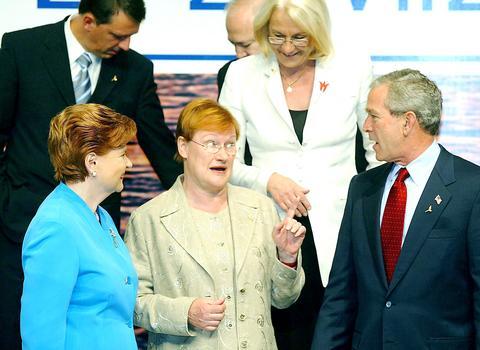NATO's decision to help train Iraqi armed forces has set off wrangling among the allies, as more differences emerged between the US and France on how to best help Baghdad's new government.
At a summit designed to emphasize NATO unity after deep divisions caused by the US-led war on Iraq 15 months ago, France and the US also clashed over Afghanistan and Turkey's relations with the EU.
As the alliance struggles to define its role in a post-Cold War world, French President Jacques Chirac forcefully stated his opposition to any collective NATO presence on the ground in Iraq, suggesting it should limit its role to coordinating national efforts and training outside the country.

PHOTO: EPA
"I am completely hostile to the idea of a NATO establishment in Iraq," Chirac told reporters. "It would be dangerous, counterproductive and misunderstood by the Iraqis, who after all deserve a little bit of respect.
The months of delays have cast doubt on NATO's credibility as it reinvents itself as a global security force in the post-Cold War era.
Chirac accused US President George W. Bush of meddling in EU affairs by pushing for the EU to bring Turkey into its ranks.
"It's a bit like if I told the United States how they should manage their relations with Mexico," the French leader said.
US officials insisted the Iraqi training program should be a centralized operation under a NATO command in Iraq -- although they accepted that reluctant countries, such as France and Germany, could limit their contribution to training outside the country.
With allies stressing the urgency of aiding the fledgling Iraqi forces following the surprise transfer of power to the new government on Monday, the debate on how NATO puts its agreement into practice will start when alliance envoys meet today in Brussels.
On Afghanistan, Chirac rejected a US proposal that NATO's elite new response force be deployed to provide security for elections scheduled in September.
France agreed with other allies that NATO should send hundreds more troops for the elections, but said the response force should be used only for emergency situations, not for peacekeeping.
The force is "meant to act in a known crisis, which is obviously not the case in Afghanistan today," Chirac said on Monday, the first day of the summit. Diplomats said the issue provoked a sharp exchange in Istanbul between US Defense Secretary Donald Rumsfeld and his French counterpart, Michele Alliot-Marie.
France was not the only country with reservations, but the US said the force would be an ideal solution to NATO's difficulties in mustering troops for Afghanistan.
As usual, the US was backed by Britain. "The key is that the response force NATO has is deployed to help the elections," said Prime Minister Tony Blair.
One possible solution could be using the NATO Response Force as an "over the horizon" force held in reserve to help peacekeeping in Afghanistan in a crisis. Officials said a reconnaissance team from the force could visit Afghanistan soon to assess how it could be involved.
The alliance agreed in October to expand the force but has been unable to persuade governments to provide needed troops, apart from Germany, which sent 240 soldiers to Kunduz.

DITCH TACTICS: Kenyan officers were on their way to rescue Haitian police stuck in a ditch suspected to have been deliberately dug by Haitian gang members A Kenyan policeman deployed in Haiti has gone missing after violent gangs attacked a group of officers on a rescue mission, a UN-backed multinational security mission said in a statement yesterday. The Kenyan officers on Tuesday were on their way to rescue Haitian police stuck in a ditch “suspected to have been deliberately dug by gangs,” the statement said, adding that “specialized teams have been deployed” to search for the missing officer. Local media outlets in Haiti reported that the officer had been killed and videos of a lifeless man clothed in Kenyan uniform were shared on social media. Gang violence has left

US Vice President J.D. Vance on Friday accused Denmark of not having done enough to protect Greenland, when he visited the strategically placed and resource-rich Danish territory coveted by US President Donald Trump. Vance made his comment during a trip to the Pituffik Space Base in northwestern Greenland, a visit viewed by Copenhagen and Nuuk as a provocation. “Our message to Denmark is very simple: You have not done a good job by the people of Greenland,” Vance told a news conference. “You have under-invested in the people of Greenland, and you have under-invested in the security architecture of this

Japan unveiled a plan on Thursday to evacuate around 120,000 residents and tourists from its southern islets near Taiwan within six days in the event of an “emergency”. The plan was put together as “the security situation surrounding our nation grows severe” and with an “emergency” in mind, the government’s crisis management office said. Exactly what that emergency might be was left unspecified in the plan but it envisages the evacuation of around 120,000 people in five Japanese islets close to Taiwan. China claims Taiwan as part of its territory and has stepped up military pressure in recent years, including

UNREST: The authorities in Turkey arrested 13 Turkish journalists in five days, deported a BBC correspondent and on Thursday arrested a reporter from Sweden Waving flags and chanting slogans, many hundreds of thousands of anti-government demonstrators on Saturday rallied in Istanbul, Turkey, in defence of democracy after the arrest of Istanbul Mayor Ekrem Imamoglu which sparked Turkey’s worst street unrest in more than a decade. Under a cloudless blue sky, vast crowds gathered in Maltepe on the Asian side of Turkey’s biggest city on the eve of the Eid al-Fitr celebration which started yesterday, marking the end of Ramadan. Ozgur Ozel, chairman of the main opposition Republican People’s Party (CHP), which organized the rally, said there were 2.2 million people in the crowd, but